Pelvic Health Physical Therapy Level 2 Lab
PH2 Lab
9.25 Contact Hours
9.25 Contact Hours
Overview
In this in-person course, Physical Therapists, Physical Therapist Assistants, and 2nd Year/3rd Year Student Physical Therapists* will gain skills immediately applicable in the clinic. The PH2 Lab course includes complete internal vaginal pelvic floor, internal rectal pelvic floor muscle and external abdominopelvic examination and treatment techniques. Clinical decision-making and an integration of skills and knowledge acquired at PH1 Webinar + PH1 Lab (or PH1 Combined), PH2 Bowel Dysfunction Webinar, PH2 Pelvic Pain Webinar will be implemented.
Course participants of all genders may be present in the room during the completion of examinations. Please see the Requirements regarding lab participation expectations and model instructions.
Lab Overview
- Infection control
- Rectal exam
- Biofeedback
- Balloon lecture/hands-on lab
- Pelvic manual therapy lab
- Summative skills assessment
Included
- 🕒 9.25 Contact Hours
- 📓 Printed lab manual
- ✔️ Supervised lab activities
- 📑 Certificate of Completion
- 🥇Shareable Digital Badge
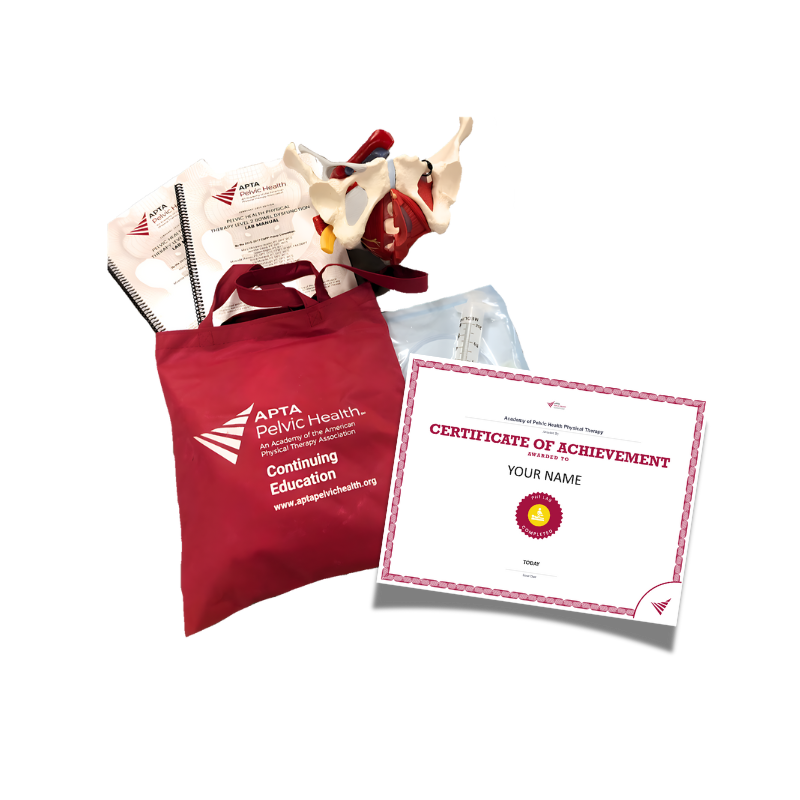
Certification Affiliation
This course must be completed after you have successfully completed and passed the PH1 Webinar course in order to complete the PH1 course level as a whole. This course is also affiliated with the Academy's Certificate of Achievement in Pelvic Health Physical Therapy (CAPP-Pelvic) Program. While the CAPP-Pelvic certification is optional to pursue, we encourage all eligible and are already actively taking CAPP-Pelvic affiliated courses to pursue it to earn the CAPP-Pelvic distinction.
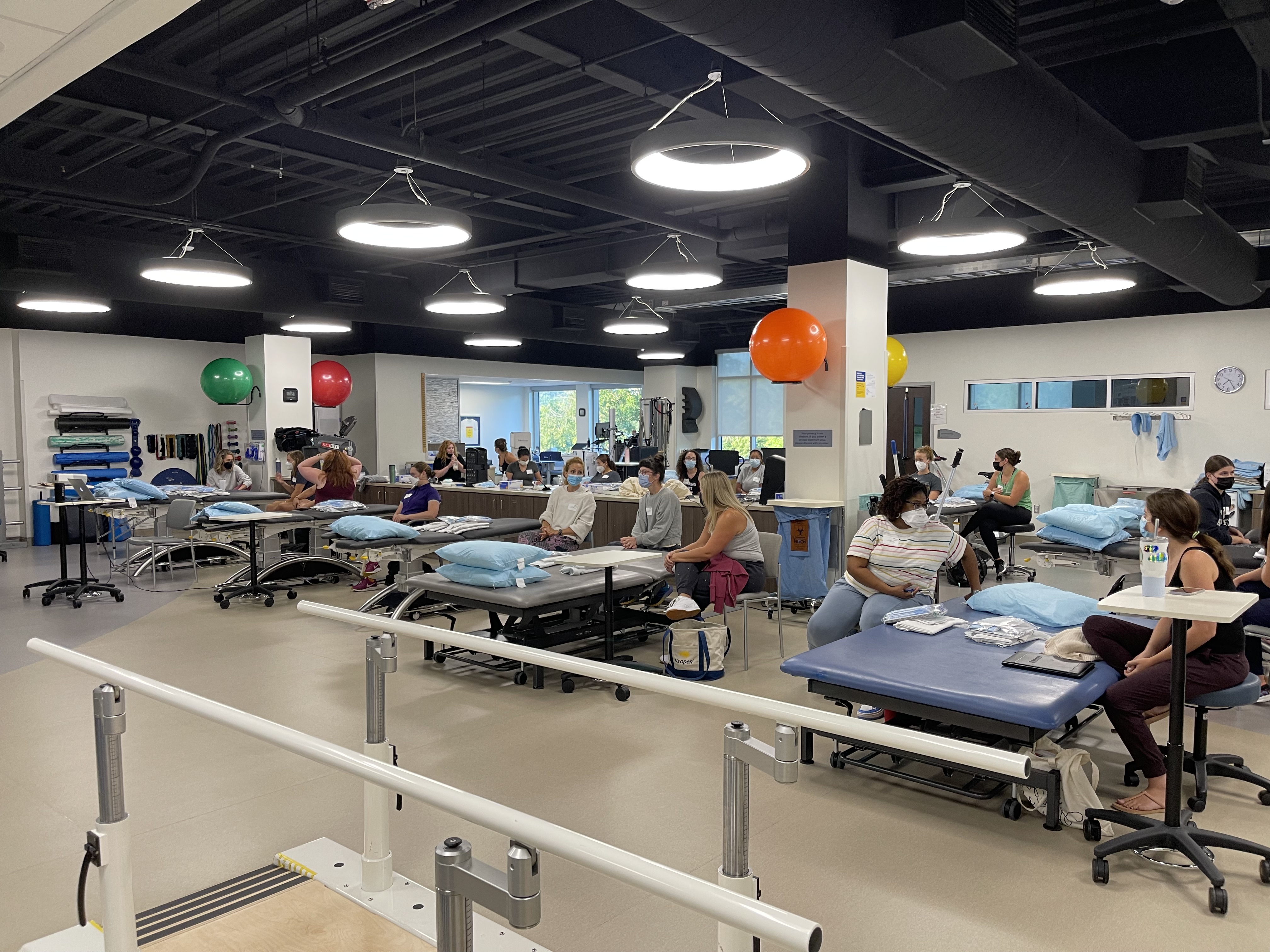
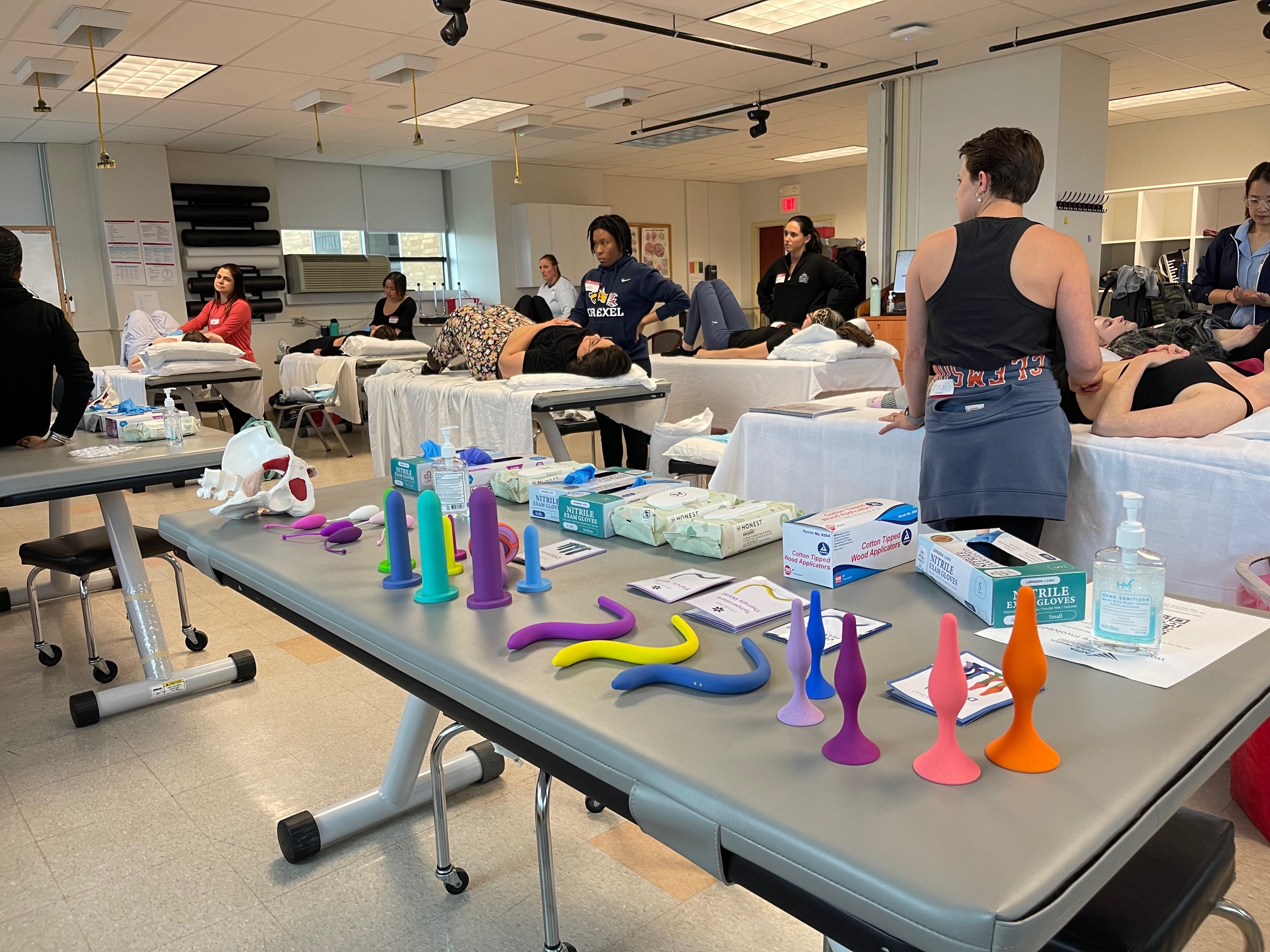
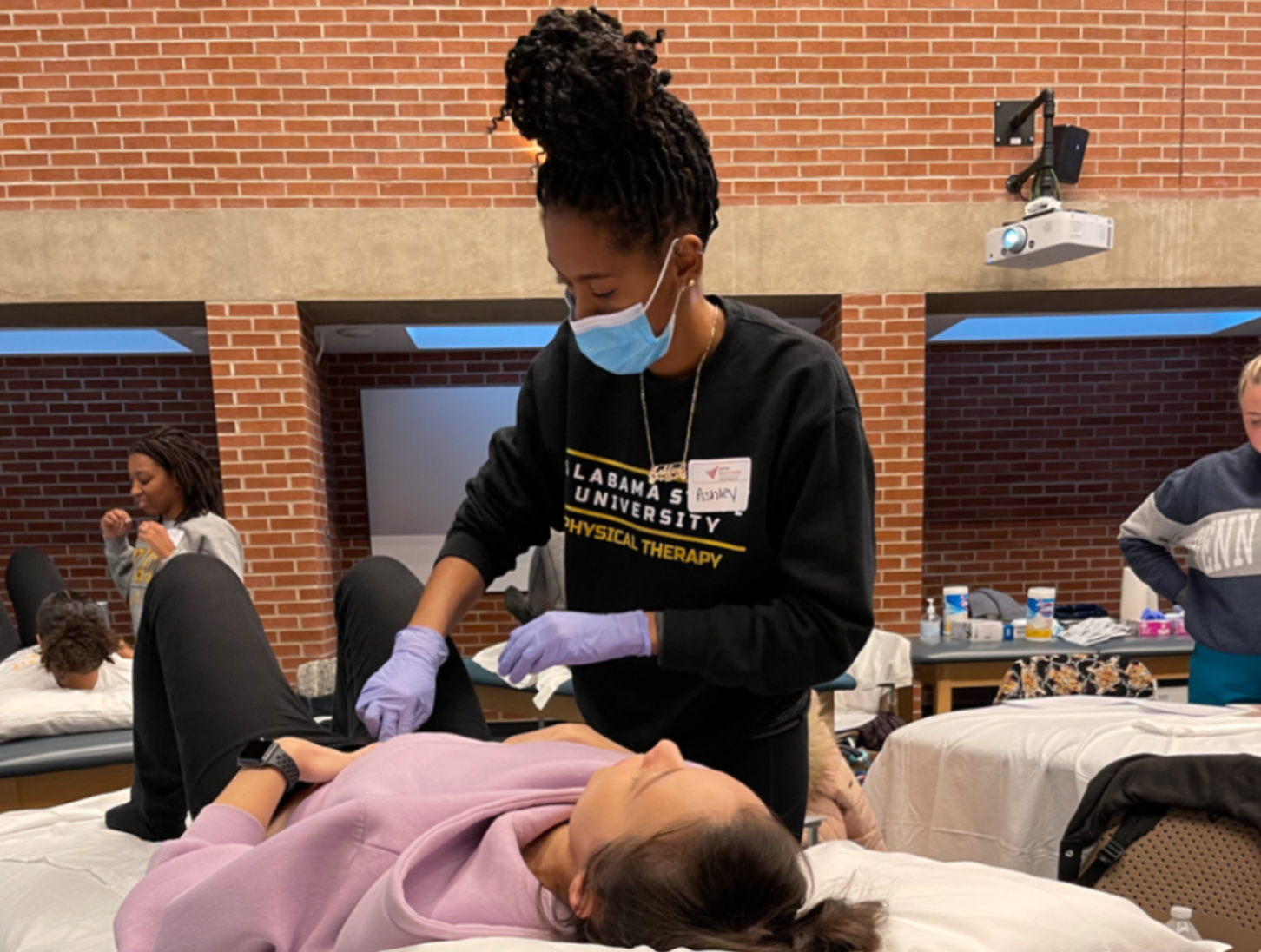
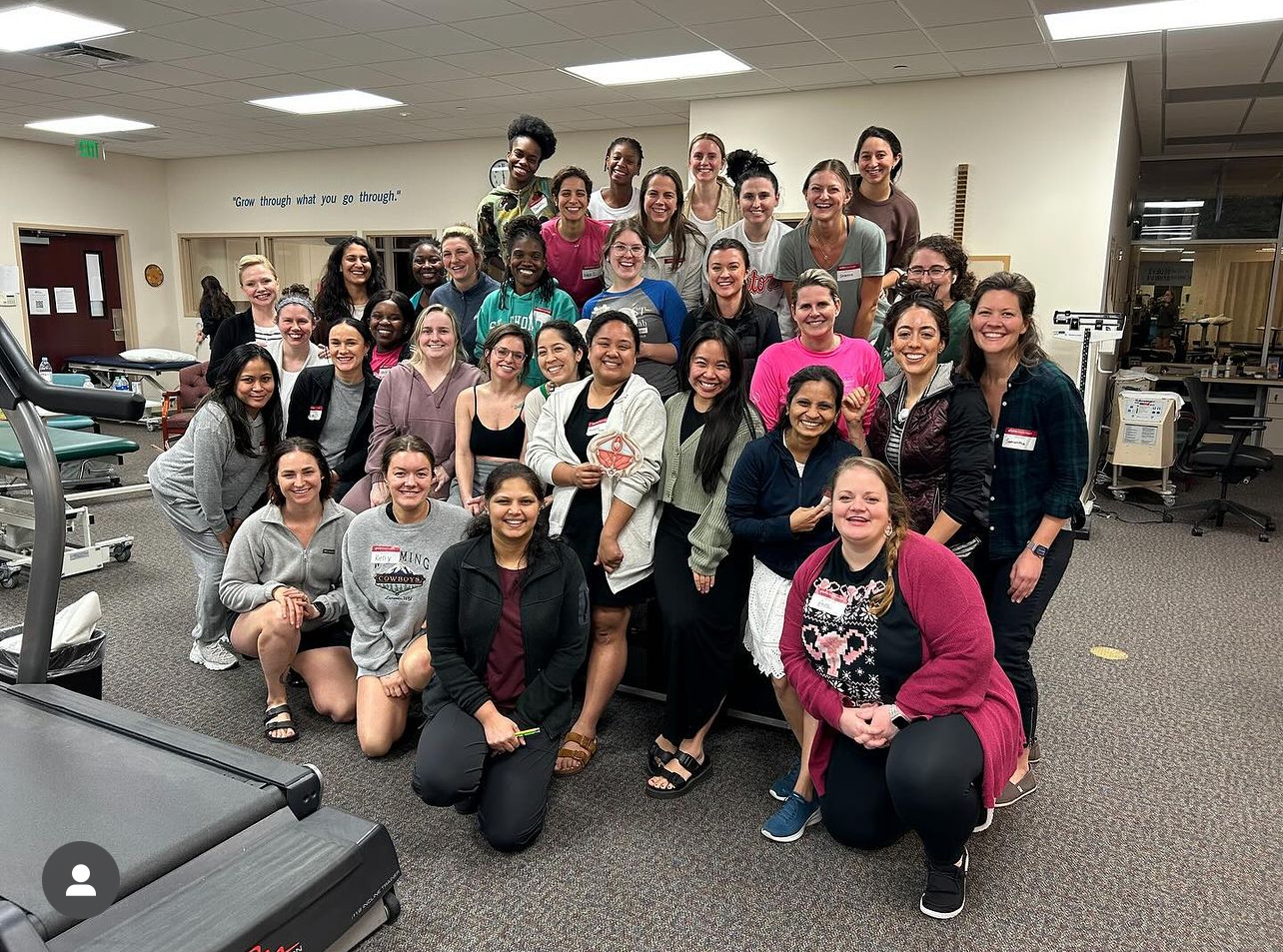
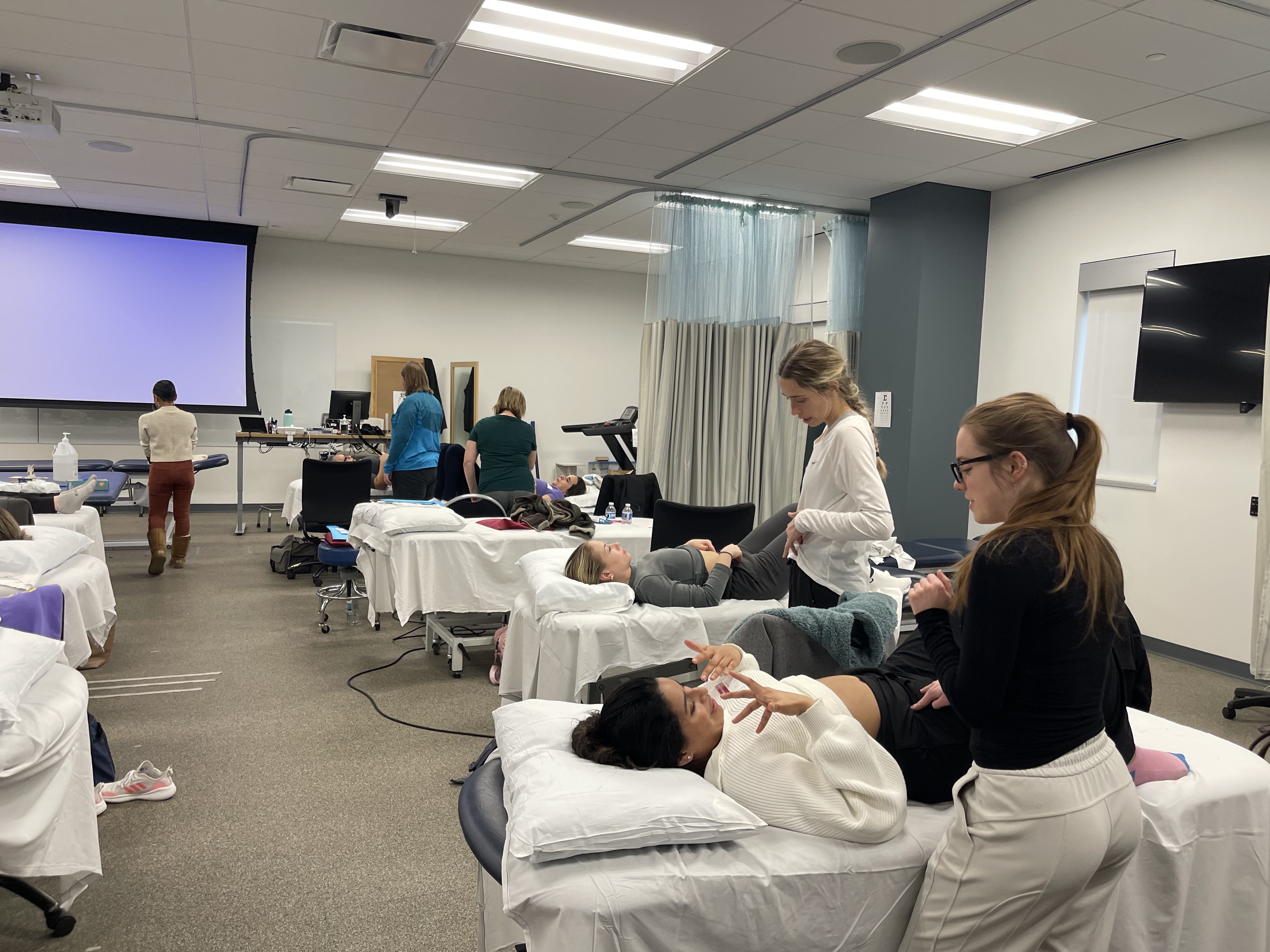

Learning Objectives
Upon completion of the PH2BD Webinar, PH2PP Webinar, and this PH2 Lab, participants will be able to:
Examination / Evaluation
-
Describe the anatomic, physiologic and neurological components of defecation and dysfunctional defecation.
-
Perform an appropriate evaluation of a patient with bowel disorder diagnoses to include fecal and anal incontinence, irritable bowel syndrome, constipation and obstructed defecation.
-
Demonstrate ability to perform rectal pelvic floor muscle examination for patients with bowel dysfunction.
-
Assess coccygeal function and joint mechanics for patients with pelvic pain or bowel dysfunction.
-
Describe the anatomic, physiologic and neurological components of pelvic pain diagnoses.
-
Perform an appropriate evaluation of a patient with pelvic pain diagnoses to include pudendal neuralgia, vulvodynia, vaginismus, painful bladder syndrome, endometriosis and coccydynia.
-
Demonstrate ability to perform a vaginal pelvic floor muscle examination for patients with pelvic pain diagnoses.
-
Describe the female sexual response and demonstrate understanding of sexual dysfunction.
Diagnosis / Prognosis
-
Differentiate between musculoskeletal impairments related to bowel dysfunction and signs and symptoms associated with non-musculoskeletal pathology requiring further medical examination.
-
Develop functional goals for musculoskeletal impairments identified in patients with bowel disorders based on a systematic interview and examination of the patient.
-
Demonstrate understanding of colon and anorectal function testing for bowel disorders.
-
Differentiate between musculoskeletal impairments related to pelvic pain and signs and symptoms associated with non-musculoskeletal pathology requiring further medical examination.
-
Develop functional goals for musculoskeletal impairments identified in patients with pelvic pain based on a systematic interview and examination of the patient.
Intervention
-
Develop an evidence-based and appropriate plan of care for physical therapy intervention of musculoskeletal impairments for patients with bowel dysfunction.
-
Perform manual myofascial release techniques, trigger point release techniques, coccyx mobilization for the treatment of patients with bowel dysfunction.
-
Describe and perform appropriate clinical application of surface electromyographic (sEMG) biofeedback for bowel dysfunction diagnoses.
-
Describe and perform appropriate clinical application of digital rectal biofeedback and rectal balloon biofeedback as an intervention for patients with bowel dysfunction.
-
Provide behavioral intervention strategies to improve bowel function such as diet, lifestyle changes, and proper toileting techniques and posture.
-
Develop an evidence-based and appropriate plan of care for physical therapy intervention of musculoskeletal impairments for patients with pelvic pain.
-
Perform manual myofascial release techniques, trigger point release techniques and abdominopelvic interventions for the treatment of patients with pelvic pain.
-
Describe appropriate clinical application of modalities for pelvic pain diagnoses.
-
Perform external manual therapy techniques and rigid taping techniques to address pain and dysfunction related to the coccyx.
-
Provide behavioral intervention strategies to manage pelvic pain including lifestyle changes, diet, and proper posture.
Requirements
ELIGIBILITY REQUIREMENT
- Licensed Physical Therapist (PT)
- Licensed Physical Therapist Assistant (PTA)
- 2nd Year Physical Therapy Student (SPT)
- 3rd Year Physical Therapy Student (SPT)
- No other professional types are permitted for this course. No exceptions will be made
PREREQUISITES
- Successful completion of the PH1 Webinar + PH1 Lab (or PH1 Combined), PH2 Bowel Dysfunction Webinar, PH2 Pelvic Pain Webinar
- We recommend students have some orthopedic and musculoskeletal coursework in their curriculum prior to attending the course.
LAB PARTICIPATION
The APTA Academy of Pelvic Health welcomes all SPTs, PTAs and PTs to participate in our courses regardless of gender identity, medical condition or pelvic anatomy. For all pelvic health labs, attendees are expected to be both the examining “therapist” and “patient” participant. If a participant has a pre-existing medical condition that prevents them from having an examination (see Medical Model Guidelines) or lacks the anatomical components examined for the specific lab, they are encouraged – but not required – to bring a medical model to serve as the ‘patient’ during labs. Bringing a model will provide the most hands-on experience, but alternative accommodations will be made for those who do not bring one. Accommodations may include participating in groups of three.
We do request that the participant fill out a form so that we are aware and can plan accommodations as needed.
- Report Medical Conditions | Please fill out this form only if you have medical conditions to disclose.
- Medical Model Form | Medical Model Guidelines
SPECIAL ACCOMMODATIONS
If you require special accommodations to fully participate in this upcoming course, please send us a message to discuss your needs and make necessary arrangements.
Please adhere to the medical model guidelines below when bringing in a medical model. The model must be present for all labs and skill checks. If you are bringing a medical model OR are opting out of participating as a ‘patient’ in internal labs for the following reasons, please fill out appropriate forms ASAP and inform the Academy office so that instructors are informed BEFORE the lab so that we can ensure any additional accommodations can be planned.
Medical Model Form | Medical Model Guidelines
CONDITIONS THAT MAY NECESSITATE USE OF A MODEL OR OPTING OUT OF INTERNAL PELVIC EXAM LAB PARTICIPATION AS A ‘PATIENT’
- A participant who is experiencing an active exacerbation of an abdominopelvic medical condition (e.g. inflammatory bowel disease) or dermatologic condition (e.g.. lichens sclerosis), that would prevent an exam:
- A participant with a history of sexual abuse or trauma
- The Academy is mindful of how participation as a “patient” in examinations might impact a participant who has a history of sexual abuse or trauma
- Some participants may experience an emotional response as the “patient”
- It is the participant’s decision to disclose any history to the instructor as necessary; any information shared remains confidential
- A participant that currently has or history of pelvic pain or painful sexual activity
- Some participants may experience physical discomfort and/or an emotional response
- If you have a history of pelvic pain or painful sexual activity but choose to
participate as the “patient” in labs, you may choose to disclose the current
or history of pelvic pain to the faculty
- Confirmed or suspected pregnancy
- You must submit a signed medical release from your medical provider that
allows you to participate in all examinations
- You must submit a signed medical release from your medical provider that
- A participant who has never had an internal gynecological examination
- Social, cultural, or religious practices
CONDITIONS THAT REQUIRE USE OF A MEDICAL MODEL OR OPTING OUT OF INTERNAL PELVIC EXAM LAB PARTICIPATION AS A 'PATIENT'
- Recent surgical procedure without medical clearance
- Less than six (6) weeks postpartum
- Active urinary tract, vaginal, or rectal infections
- Active lesions from sexually transmitted infections
- Indwelling catheter
- The participant lacks the anatomical components for examination
THE FOLLOWING CONDITION DOES NOT REQUIRE A MEDICAL MODEL
-
Participants who are actively menstruating
-
A menstrual disc, if desired, will be provided to participants to enable internal vaginal examinations
-
FILL OUT THIS FORM BEFORE THE LAB IF YOU INTEND TO BRING A MEDICAL MODEL OR OPTING OUT AS ‘PATIENT’ FOR THE LAB
If a participant chooses to use a medical model OR are planning to opt out of being a ‘patient’ based on the reasons listed above, you MUST inform the Academy office at hello@aptapelvichealth.org or using the attached form that a model will be used OR you are opting out and reason.
SPECIAL ACCOMMODATIONS
If you require special accommodations to fully participate in this upcoming course, please send us a message to discuss your needs and make necessary arrangements.
WHAT TO BRING
- Comfortable, loose-fitting clothing that is comfortable for you to move in during the lab activities (some attendees bring a sweater or pullover as temperatures in the auditoriums and classrooms can often fluctuate)
- Laptop and charger (if you wish to take notes electronically; printed lab manuals will be provided by the Academy)
- Snacks and refreshments (the Academy provides some light refreshments but you are welcome to bring your own as well)
- Pencils and/or pens (useful for lab activities and worksheet activities)
- Hair ties (if you have long hair, we recommend for you to tie it in a ponytail during the lab activities)
- Nail filer (due to the physical interaction between attendees, we recommend for you to file your nails prior to lab activities)
WHAT ELSE YOU SHOULD KNOW
- You must complete both PH1 Webinar Lecture and PH1 In-Person Lab to advance to Pelvic Health Physical Therapy Level 2. In order to proceed to the Pelvic Health Physical Therapy Level 3 course, you must complete the Pelvic Health Physical Therapy Level 2 Bowel Dysfunction AND the Pelvic Health Physical Therapy Level 2 Pelvic Pain course. Both courses must be taken to fulfill the Level 2 requirement. For those who are now taking the hybrid version of all the Pelvic Health Physical Therapy courses, you may take all the PH webinars first (i.e. PH1 Webinar, PH2 BD Webinar, PH2 PP Webinar) and then follow with the labs.
- Course participants of all genders may be present in the room during the completion of examinations.
- Appropriate draping and positioning will be performed; however, visual assessment and palpation of external and internal anatomy are required for safe examination practice.
- External and internal examinations performed in the course pose a no greater risk than a standard gynecologic or colorectal examination.
- If you have any medical conditions you wish to report prior to your course participation or if you want to bring a medical model to stand in your place during the course, you must complete the designated forms in your Course Learning Center after you register for the course.
ATTENDANCE REQUIREMENT
Attendees must be present throughout the duration of the course. Contact hours will be forfeited and the attendee will be dismissed if the attendee:
- Misses two (2) or more lecture hours
- Misses any part of the Case Study Presentation and related group activities
To advance to the next course level, the attendee who missed the above will have to retake the course at her/his/their own expense.
Should extenuating circumstances arise, it is the responsibility of the participant to notify a course faculty member of the need to leave. Consideration for course completion will be made on a case-by-case basis.
CEU APPROVAL
Unless otherwise noted in the course description, the Academy of Pelvic Health Physical Therapy does not independently seek approval for course Continuing Education Unit (CEU) numbers in each state. It is the responsibility of each participant to submit their own CEU applications within their respective states. We are committed to assisting you in obtaining and supplying any required documentation for your CEU application. Historically, our course participants have consistently encountered no difficulties in securing approval for continuing education credits (CEUs) upon submission to their state's board.
Testimonials
"The instructor and teaching assistants did a great job supporting the class during the labs. I felt like it was easy to ask questions and ask for help."
"Loved all the teachers and TA’s, everyone was so knowledgeable and passionate! I appreciated that they structured the lab so the rectal components were all in the morning."
"Very practical application and easy format for incorporating in to practice."
“The instructor and lab assistants did a great job supporting the class during the labs. I felt like it was easy to ask questions and call for help. The commentary/clinical pearls from staff during the testing and final words helped pull the day together.”
“Thought the lab was great, learned a lot and thought all the skills reviewed were nicely integrated from the info taught during the webinars.”
Schedule
- Day 1: 7:30 am – 5:30 pm *Local time
- Breaks are included: 15-minute morning break, 1-hour lunch break, and 15-minute afternoon break
Already registered? Access your course materials!
Access the Learning Center
Helpful Links- Lab Preparation Tips
- Frequently Asked Questions
- Event Registration Terms & Conditions
- Privacy Policy
- Sponsors & Advertisers
- Cancel My Registration or Transfer to Another Course
- Request a Past Course Certificate
- Sign Up for New Course Email Alerts
Lab Participation
Please watch these helpful videos to prepare yourself for the lab course.
Lab Expectations
Using a Medical Model in Lab
Self-Care During Lab
How Lab Works
CAPP-Pelvic Certification Pathway
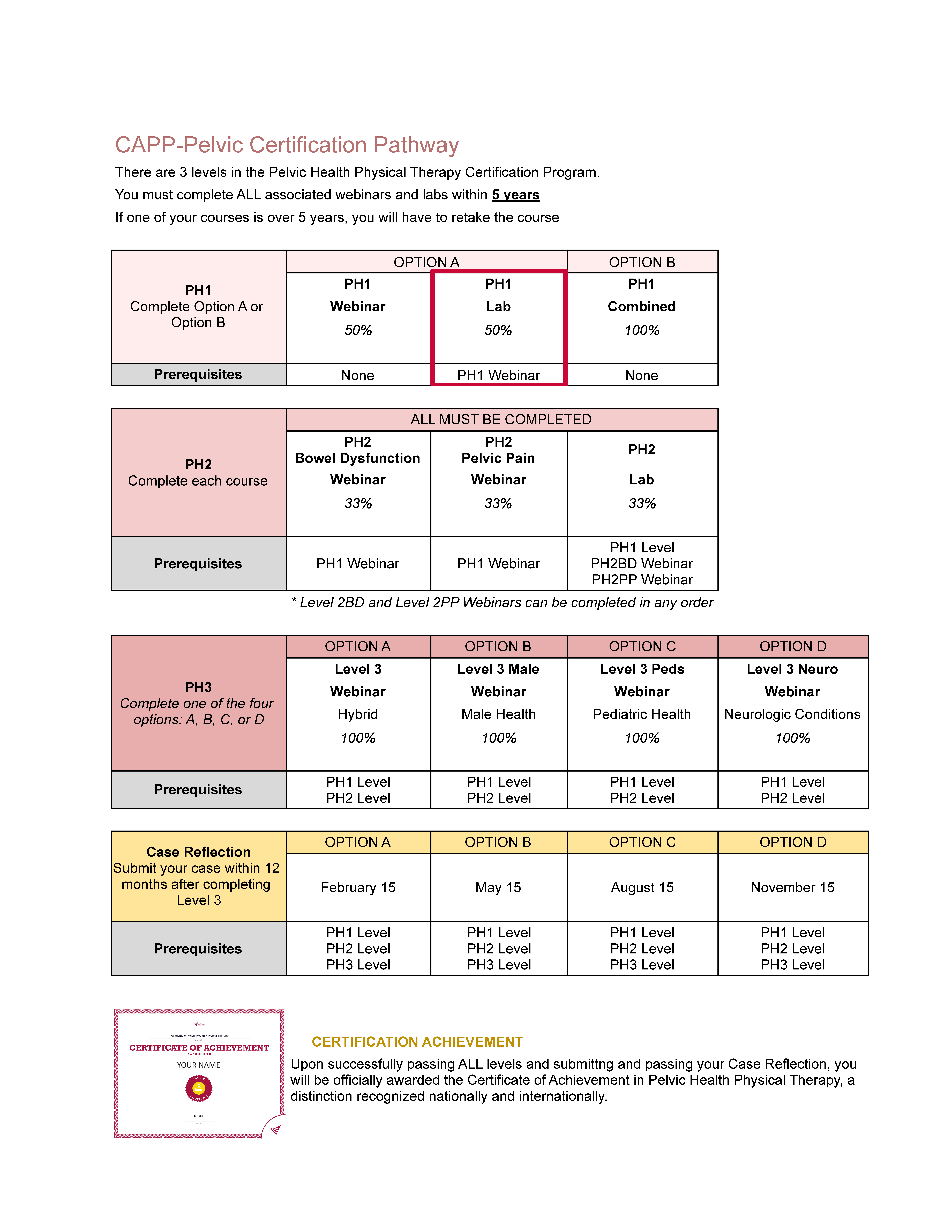
Pricing
Please note that early-bird rates expire 30 days prior to the scheduled course. Want to qualify for member pricing? Join the Academy today!
| Type | Early-Bird | Regular |
|---|---|---|
| PT Member | $299 | $324 |
| PTA Member | $225 | $250 |
| SPT Member | $225 | $250 |
| Non-Member | $345 | $370 |
Helpful Links
- Discount Promotions
- Scholarship Opportunities
- Employer Justification Letter Template
- Registration Cancellation Policy


